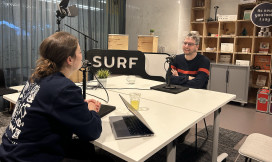Flexible education organisation
Students expect convenience and freedom of choice, to study what they want, in their own time, place and pace. As long as they study, but also in lifelong development. Institutions should offer flexibility where students ask for it, for instance making the education offer more flexible, facilitating student mobility and issuing digital certificates.

At the Rotterdam University of Applied Sciences, students receive ECTS credits for the knowledge they acquire, but how do you reward skills properly? The university of applied sciences uses edubadges to offer differentiation in this respect, so that students acquire skills at the level that suits them and they can make these visible on their CV.

Case study
A common language for education
Case study
"Education is music, and the institution is the orchestra. My educational dream is that we find ways to play more harmoniously as an orchestra." Speaking is Pien Walraven, information manager at Radboud University since the end of 2022. With a lexicon for education, she wants to improve ensemble playing.

Case study






